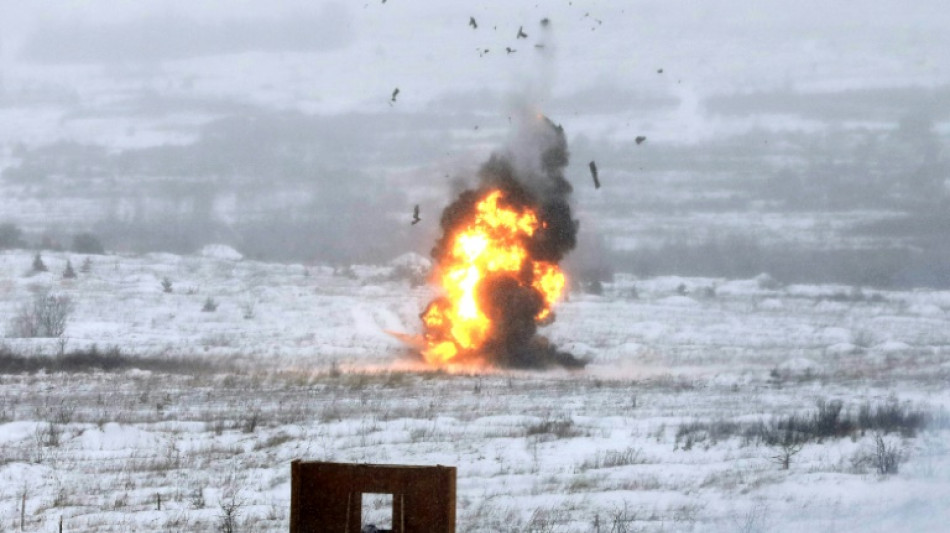
RBGPF
0.1600


Top Pentagon officials on Friday backed a renewed push for diplomacy to avert conflict in Ukraine, after President Volodymyr Zelensky urged Western leaders to avoid stirring "panic" over the Russian troop buildup on his country's borders.
In a call that lasted more than an hour, French President Emmanuel Macron and Russian leader Vladimir Putin likewise agreed on the need for de-escalation, with Putin saying he had "no offensive plans", according to a Macron aide.
At the Pentagon top officials urged a focus on diplomacy while saying that Russia now had enough troops and equipment in place to threaten the whole of Ukraine.
Any such conflict, warned the top US general, Joint Chiefs Chairman Mark Milley, would be "horrific" for both sides.
"If that was unleashed on Ukraine, it would be significant, very significant, and it would result in a significant amount of casualties," Milley said.
"And you can imagine what that might look like in dense urban areas, along roads and so on and so forth. It would be horrific, it will be terrible," he said.
Neither Putin nor his Western counterparts have until now appeared ready to give ground in the weeks-long crisis, the worst in decades in the region between Russia and Western Europe.
But speaking alongside Milley, Defense Secretary Lloyd Austin said war in Ukraine could still be avoided.
"Conflict is not inevitable. There is still time and space for diplomacy," said Austin.
During his talks with Macron, Putin "expressed no offensive plans and said he wanted to continue the talks with France and our allies," an aide to the French president said.
Their conversation "enabled us to agree on the need for a de-escalation," the aide told journalists. Putin "said very clearly that he did not want confrontation."
- Complex threat -
Since October Russia has amassed more than 100,000 combat troops and equipment, and support forces, along its frontier with Ukraine and more recently in Belarus, which borders Ukraine on the north.
Western officials say Russia has also mustered more air and sea assets in the region, creating a complex threat like none seen since the Cold War.
Moscow has demanded wide-ranging security guarantees from the West, including that Ukraine never be allowed to join NATO.
Those demands have been the subject of intensive negotiations, with the West warning of far-reaching consequences if diplomacy fails and Russia attacks.
"We don't need this panic," the Ukrainian leader Zelensky told a news conference with foreign media, insisting he wanted to avoid hurting his country's already battered economy.
"There are signals even from respected leaders of states, they just say that tomorrow there will be war. This is panic -- how much does it cost for our state?" he asked.
- Russia's concerns not addressed -
Putin also made clear to Macron during their talks that the written responses from the West to his demands this week had fallen short of Russia's expectations, the Kremlin said.
"The US and NATO responses did not take into account Russia's fundamental concerns including preventing NATO's expansion," Putin said, according to the Kremlin's readout of the call.
He added that the West had ignored the "key question," that no country should strengthen its security at the expense of others, adding Russia would "carefully study" the responses "after which it will decide on further actions".
Russia has also demanded a pullback of NATO forces deployed to Eastern European and ex-Soviet countries that joined the alliance after the Cold War.
In a sign of continued tensions, Russia announced Friday evening it had added several EU officials to a list of people banned from entering the country saying they were responsible for "anti-Russian policies".
- 'Do the right thing' -
The emergence of the top two US military officials to speak on the crisis, after weeks of silence, suggested Washington saw the need to reinforce its message, that a diplomatic solution was possible but that the United States remains committed to defending NATO allies which neighbor Ukraine and Russia.
"Mr. Putin can do the right thing as well," said Austin.
"There is no reason that this situation has to devolve into conflict. He can choose to de-escalate. He can order his troops away," he said.
The Putin-Macron phone call followed talks in Paris this week between Russia and Ukraine, with France and Germany alongside, which produced a joint statement to preserve a ceasefire in eastern Ukraine between government forces and pro-Moscow separatists.
They also agreed to hold new talks in Berlin in February.
"Taking into account the results of the meeting" in Paris, the Kremlin said, "the mood for further work of Russia and France in this format was confirmed."
- Threat to key pipeline -
Washington and Berlin warned that the Nord Stream 2 pipeline, designed to double supplies of Russian natural gas to Germany, was at stake.
US President Joe Biden spoke Thursday by telephone with Zelensky and said the United States was considering economic support after $650 million in military assistance over the past year.
Milley said Russia itself would be hurt by war.
"If Russia chooses to invade Ukraine it will not be cost-free, in terms of casualties or other significant effects," he said.
burs-pmh/ec
P.Grant--TFWP